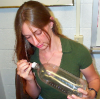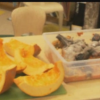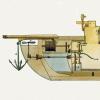Search Results
Showing results 361 to 380 of 711

If Hot Air Rises, Why is it Cold in the Mountains?
Source Institutions
This demonstration/activity helps learners understand why higher elevations are not always warm simply because "hot air rises." Learners use a tire pump to increase the pressure and temperature inside

Life in the Sidewalk Cracks
Source Institutions
In this activity, learners compare plant and animal life in different habitats including a sidewalk crack and lawn. Learners sort human-made materials and natural materials found in each habitat.

Forward-Reverse Switch
Source Institutions
In this activity, learners build a switch to turn electrical circuits on and off.

Build a Better Roof
Source Institutions
In this activity, learners will engineer a roof using simple materials to protect a construction paper person from a rainstorm.

Play Dough Moon Phases
Source Institutions
In this activity, young learners will learn about moon phases using materials found at home. This activity is adapted using play dough and cups to avoid food allergens and waste.

Balancing Act
Source Institutions
In this activity, learners will explore their center of gravity.

Exploring the Solar System: Story Blocks
Source Institutions
In this collaborative storytelling activity, learners and caregivers develop a strong story about science and exploration.
Peppy's Day in the Park
Source Institutions
In this math activity, learners build Peppy the dog the best trail and park for running around.

The Decayed Pumpkin
Source Institutions
In this "Sid the Science Kid" activity from Episode 106: My Mushy Banana, learners explore the effects of decay by comparing and contrasting something (an old pumpkin) that's decayed with the same thi

Think Fast!: Just How Quick Are You?
Source Institutions
This is an activity about reaction times. Just how quickly must an NHL goalie respond to save a shot, and how does your reaction time compare?

Puff Mobile
Source Institutions
In this engineering activity, challenge learners to design a car using only 3 straws, 4 Lifesavers™, 1 piece of paper, 2 paper clips, tape, and scissors.
Take a Guess
Source Institutions
In this activity, learners use what they know about probability to figure out what is in a mystery bag. Learners analyze data to guess how many of each color crayons are in the bag.

Program a Friend
Source Institutions
In this activity (on page 2), one person "programs" the other like a robot to move through a space, trying to get them to avoid obstacles and reach a goal.

Three Colors of Light
Source Institutions
Have fun with additive mixing! Observe what happens when the three primary colors of light--red, green and blue--are mixed together, resulting in white light.
Many Seeds: Estimating Hidden Seeds
Source Institutions
In this activity, learners will estimate how many seeds are in a fruit or vegetable, then count to find out. The result: mix estimation with healthy eating.

Taste Match Game
Source Institutions
In this activity (3rd activity on the page), learners taste test different foods and categorize them as sweet, bitter, sour, or salty. Learners compare their results with the group.

Film Canister Rocket
Source Institutions
In this activity, learners construct and launch rockets using simple materials and their understanding of chemical reactions.
Work for Your Money
Source Institutions
In this math activity, learners earn "money" by completing simple tasks. Learners complete as many "jobs" as possible in a set amount of time.

Design a Submarine
Source Institutions
Learners act as engineers and design mini submarines that move in the water like real submarines.

Static Water
Source Institutions
In this activity, learners will use static elecricity to bend a stream of water without touching it. Learners will explore physics and cause and effect through this activity.
